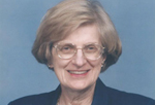
 Sarah (Sally) Gustafson
Sarah (Sally) Gustafson
Sarah (Sally) Gustafson's son told her, "Mom, if you don't write
grandfather's history, no one will." That story-which is to be a book
entitled
The Incredible Unknown Inventor: Chemist James Bert Garner, 1870-1960
-begins with a young man from Lebanon, Indiana, James Bert Garner, who
entered Wabash College in 1889.
Credited with inventing the gas mask used in WWI, Garner was a
distinguished inventor with over 25 patents in the U.S. and Canada-related
to coal, natural gas, oil, rubber, the steel industry, home cooking
appliances, and other areas. He also obtained a patent on the procedures
for removing nicotine from tobacco. Sarah says of her father, "He was an
incredibly inventive and creative chemist."
Garner received three degrees from Wabash: a BS in 1893, an MS in chemistry
in 1895, and an honorary doctorate degree in science in 1950. Sarah, the
youngest of Garner's twelve children, was 15 years old when her father
received the honorary degree. She says, "I recall walking on the arm of
then President Frank Sparks as we went to the dinner afterward." Garner
also received two degrees from the University of Chicago, an MA and PhD in
chemistry, was elected a member of Phi Beta Kappa, and graduated magna cum
laude. While he was studying for his MS at Wabash he served as an assistant
in chemistry and mineralogy; while working on his PhD, he worked as a
Fellow and lecture assistant at the University of Chicago. He said of the
latter experience, "I was self-supporting for the first time in my life."
While at Wabash, Garner had been a scholarship recipient. His father was a
grocer, and Garner dropped out his sophomore year when his father became
ill. Garner then returned to Wabash and finished his degree in three years
while also remaining active in the Ouiatenon Yearbook, Phi Delta Theta
social fraternity, and the Calliopean literary society. In his senior year,
he was the only married man on campus. "He had enthusiasm for life!" says
Sarah.
After receiving his PhD in 1897, Garner became head of the chemistry
department at the newly founded Bradley Polytechnic Institute in Peoria,
Illinois. In 1901, he returned to Wabash College to serve as head of the
chemistry department, at that time the endowed Peck Professor of Chemistry.
From 1901 to 1914, students who graduated under Garner were known as
"Garner's men," and 18 of them went on to receive PhDs. One of Garner's
former students, "Doc" Lloyd Howell, had the next largest number, with 17
of his students receiving PhDs. Garner fulfilled his goal of training
leaders in science, technology, education, and business.
With a large family to support, Garner accepted a position as the Director
of Research for various fellowships at the Mellon Institute in Pittsburgh,
Pennsylvania, including Standard Oil Co., Hope Natural Gas Co., and
Pittsburgh Des Moines Steel Co. In 1915 he read an account of the gas
attacks on the British forces in WWI. The account prompted the invention of
the Garner gas mask worn by thousands of troops and saving the lives of
many soldiers.
Listed in Who's Who in America, Garner was recognized as a Fellow
of the American Academy of Sciences, a member of the American Chemical
Society, and a member of the Natural Gas Association of America. He
belonged to the Masonic order, and was a member of the Presbyterian Church.
He greatly enjoyed taking students to scientific meetings throughout
Indiana and involving them in real-life problem-solving in community health
and sanitation projects. He died in 1960.
To honor her father's achievements, Sarah and other family members have
established the Garner-Gustafson Scholarship in Chemistry in Memory of
James Bert Garner. Recent cash gifts from Sally and Gus, along with her
brother, Dr. Charles Garner and wife, Helen, and Sally's son, Dr. Charles
L. Gustafson, will help establish the fund; an additional amount is
forthcoming from Sally's estate through a will provision. Additional
support to benefit the fund will include royalties from her book,
increasing the scholarship fund even more in the future. Based on merit and
financial need, the scholarship will support Wabash students majoring in
chemistry or biochemistry.
With pride, Sarah says that Garner was "a fine scientist and an outstanding
family man." She adds, "Father often said, 'If it hadn't been for Wabash, I
wouldn't have achieved what I did.'"